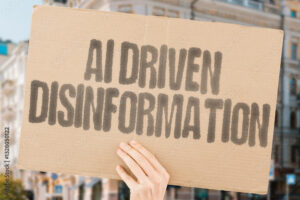Anything You Can Do, AI Can Do Better. AI Can Do Anything Better Than You?
The way that AI has crept into our world has me feeling a bit like a frog in boiling water. I didn’t even realize I was in the heat until all of a sudden I was cooked. Programs like ChatGPT have the education world all in a panic about what to do. Strangely enough, the debates are not that dissimilar to those that were had with the evolution of the calculator, word processors, and spell-checkers. The challenge the education world is facing right now is that AI is advancing faster than education can keep up, and teachers and schools are scrambling a bit to adjust and prepare for how to manage it in the classrooms.
The initial response of many schools seems to be the block it, ban it, avoid it at all costs mentality. This approach looks at AI as a way for students to “cheat”. It is quite evident that AI technology is here to stay and will only continue to evolve. As a result, schools are creating a culture of mistrust between teachers and students. Teachers become reluctant to believe that students’ writing is authentically their own, and students feel pressure to make their writing seem less polished because they don’t want it to be perceived as being AI.
I know from personal experience, after having run my own writing through AI check software for my graduate-level writing assignments, that my writing “may have elements of AI”. I knew I had written the entire assignment without any assistive technology apart from spelling and grammar checks, but I was still left asking myself, “do I need to make this sound “less AI” somehow?”
We also see AI “educational” videos being targeted at students on platforms like YouTube. They present completely fabricated information in a way that makes it seem very real to kids. Images and voices are manipulated by AI to seem very real and believable. As AI gets progressively better, it will only become more challenging to discern what is real and what is AI, especially as AI content becomes faster and easier to create. Real, true content might get pushed out by AI and become harder and harder to find.
So, what is the solution?
I think it starts with a shift in our mindset as teachers. Rather than being afraid of it, avoiding it, and punishing it, we need to meet it head-on. Learn what we can about it and invite students to take leadership in their learning as well. By fostering critical media literacy and focusing on awareness of AI, students can start to use AI as a tool to take ownership of their learning in an all-new way. We as teachers might need to adjust how we assess students’ learning, giving students opportunities to verbally explain their learning process, using handwritten responses or project-based learning as opposed to strictly computer-based assignments. It becomes the role of the teacher to rethink how students demonstrate and communicate their learning.
“Writing will be more like collage art — which, in many respects, it already is. Your single, solitary voice is distinctly yours but it’s also part of a chorus shaped by what your read and listen to and who you talk to and all sorts of elements of your culture. When you write, you are never writing alone.” – John Spencer



5 thoughts on “Anything You Can Do, AI Can Do Better. AI Can Do Anything Better Than You?”
Hey Vanessa,
I really related to your post, particularly the section about writing papers in the last year or so for our Master’s. When I first began 2.5 years ago, I had no knowledge of AI beyond the occasional pop-up message on retail websites that offered customer service. Now I run my paper through Grammarly for spelling and grammar. In the last year, Grammarly added an AI checker that will let you know the percentage of the paper that appears to be plagiarized or written by AI.
As a student, I can understand how my peers and my own students might feel. There is now a level of suspicion surrounding all written work, given the introduction of AI. This is really unfortunate.
In my classroom next year, we will be shifting to more pen and paper and project-based learning to avoid temptation, but also to shift the classroom climate. Fingers crossed!
Vanessa, you’re frog in boiling water simile was spot-on! We don’t really realize just how embedded AI is in our lives until we take a step back and look at it. Even moreso, we don’t realize that AI has been embedded in the online tools we use for much longer than we think.
Your last quote from John Spencer also hits home for me. It reminds me of the original series “Everything is a Remix,” put together by Kirby Ferguson. We may like to think that all of these great ideas we have are solely our own, but the reality is that every great creative gets ideas from somewhere else. Nothing is truly “original.” Maybe using Generative AI is just another way that we can pull pieces to add to our creative works.
-Jenni
Hi Vanessa,
Your blog really pulled me in. Your feeling like a frog in boiling water, well honestly I have felt the same way. AI just slowly crept into our lives, and before we knew it, it was everywhere and schools are not any exception. I appreciate how you compared today’s AI panic to older reactions to calculators or spell-check. You’re so right, we’ve faced these kinds of fears before, just with different tools.
I also really connected with the part where you talked about the pressure students feel to make their work sound “less AI.” That’s such a real issue. I’ve had similar doubts too, where I second-guess whether my writing might “sound too perfect” even when I haven’t used any AI help. It’s frustrating to feel like you need to tone down your work just to prove it’s truly yours.
Your point about AI-generated videos spreading fake information is also really important. It’s scary how real and polished they look, especially to younger students who might not know how to spot misinformation. I completely agree that we need to teach media literacy and make students more aware of how AI works and not just ban it.
Now one thing that could make your blog even stronger is maybe sharing a small personal or classroom example where AI was used in a positive way. I think it would give a real-life glimpse into how your ideas can work.
Nonetheless, it was well created post and an eye-opening reflection. I really enjoyed reading it.
Kritika
Hi Vanessa,
First, your comparison to the frog in boiling water is a striking metaphor — AI has integrated so quietly and rapidly that educators were caught off-guard. The knee-jerk reaction to ban or block AI reflects fear rather than adaptation. As you rightly mention, this fosters mistrust between teachers and students, stifling creativity and open learning. Your experience with AI checkers doubting your authentic work is a perfect example of how this mistrust is harming even honest learners.
Second, your call to shift our mindset is critical. Like calculators and spell-checkers before, AI can evolve from being seen as a threat to becoming a learning tool — if we teach students how to use it ethically and critically. Promoting media literacy, hands-on projects, and reflective practices is the way forward. John Spencer’s quote encapsulates this beautifully — writing is never done in a vacuum. AI doesn’t erase human voice; it challenges us to better understand our influences and to guide students in developing their own voices, responsibly and confidently, within an AI-infused world.
A thoughtful and compelling post, but one critique that stands out is the somewhat idealistic assumption that all students will naturally use AI ethically once they’re taught media literacy. While shifting mindsets and teaching critical AI use is essential, the post may underplay how tempting and easy it is for students—especially under pressure—to misuse AI tools for shortcuts. Simply promoting awareness doesn’t always translate to integrity, especially when grades are at stake and surveillance tools are weak.
In addition, while the post acknowledges the dangers of AI-generated misinformation, it doesn’t fully explore the teacher workload and training gap. Many educators are already overwhelmed, and expecting them to both teach content and become AI literacy experts without systemic support may be unrealistic. Professional development, updated curriculum frameworks, and time for collaboration are critical if this paradigm shift is to succeed in practice, not just in theory.
Hi Vanessa,
Thank you for a very insightful post! You really nailed it with the metaphor about the frog in boiling water. I don’t know if there has been another technological tool/advancement that has hit the educational landscape as quickly as AI has. And now we are trying to catch up!
Your point that teachers need to change their mindsets is so true! Fear is natural when we are faced with something new, and unprepared for. As someone who has baulked technology in the past, I have come to accept that technology is not the villain. Technology has enhanced and improved my life in many ways- and for me to not figure out how it can enhance or improve my classroom- is unfair for my students.
I came across the following quote that really resonated with me- “Change creates fear, and technology creates change. Sadly, most people don’t behave very well when they are afraid.” (Daniel H.Wilson). I feel this quote speaks directly to the anxiety many educators feel around technology in education. For teachers, the rapid pace of technological change can feel overwhelming- new tools, platforms, and expectations often require us to re-learn, re-think, and even reimagine our roles in the classroom. For me personally, I fear failing, and being seen as incompetent in my classroom! However, I can’t let the fear in because when I do, that is when I become frustrated, resistant and even avoidant. I think teachers need support and a lot of grace when navigating the world of educational technology.